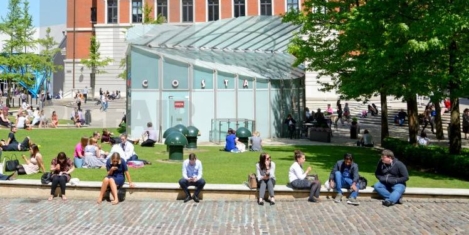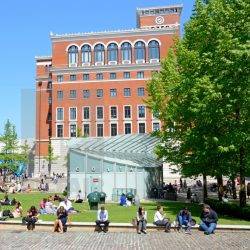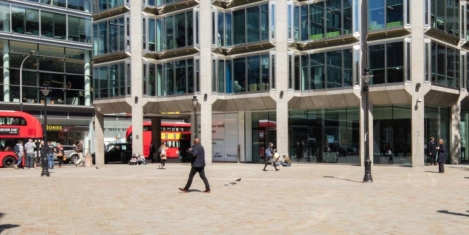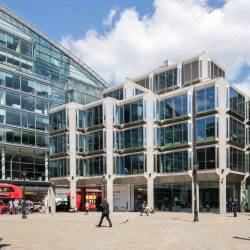To provide the best experiences, we use technologies like cookies to store and/or access device information. Consenting to these technologies will allow us to process data such as browsing behaviour or unique IDs on this site. Not consenting or withdrawing consent, may adversely affect certain features and functions.
The technical storage or access is strictly necessary for the legitimate purpose of enabling the use of a specific service explicitly requested by the subscriber or user, or for the sole purpose of carrying out the transmission of a communication over an electronic communications network.
The technical storage or access is necessary for the legitimate purpose of storing preferences that are not requested by the subscriber or user.
The technical storage or access that is used exclusively for statistical purposes.
The technical storage or access that is used exclusively for anonymous statistical purposes. Without a subpoena, voluntary compliance on the part of your Internet Service Provider, or additional records from a third party, information stored or retrieved for this purpose alone cannot usually be used to identify you.
The technical storage or access is required to create user profiles to send advertising, or to track the user on a website or across several websites for similar marketing purposes.
 Corporations are this year set to become the driving force within the flexible workspace industry as the way they view their office portfolios continues to change, according to research by Instant Offices. The flexible workspace sector has ridden the crest of a wave for the past five years with global demand increasing by 50 percent and more market supply of flex space than ever before. Instant now estimates the global market to incorporate 32,000+ centres, which represents 521 m sq. ft. This is an increase of 15 percent year on year since 2013.
Corporations are this year set to become the driving force within the flexible workspace industry as the way they view their office portfolios continues to change, according to research by Instant Offices. The flexible workspace sector has ridden the crest of a wave for the past five years with global demand increasing by 50 percent and more market supply of flex space than ever before. Instant now estimates the global market to incorporate 32,000+ centres, which represents 521 m sq. ft. This is an increase of 15 percent year on year since 2013.










 Although the majority (85 percent) of all business decision-makers agree that workplace health is a top priority, employees still aren’t being as open as they should, often playing down their illness or injury (32 percent) or feeling too busy to miss office hours (27 percent), a new survey by Bupa and Babylon Health has claimed. Worry over missing work is a key driver in avoiding appointments as seven in 10 employees (70%) have delayed or put off seeking medical advice when they should, despite the majority of business leaders having no issue with colleagues taking time off to deal with health issues. Men, young workers (18-34), Londoners and those employed in SMEs are all more likely than average to delay or put off seeking help. The data also shows that those in manual roles (vs. clerical) are more likely to shrug off illness or injury. Mark Allan, Commercial Director, Bupa UK, said: “As much as those in decision-making positions really want their employees to put their health first, they’re competing against a strong resistance from those who will strive to soldier on. This is particularly the case with those employees in SME businesses, amongst others.”
Although the majority (85 percent) of all business decision-makers agree that workplace health is a top priority, employees still aren’t being as open as they should, often playing down their illness or injury (32 percent) or feeling too busy to miss office hours (27 percent), a new survey by Bupa and Babylon Health has claimed. Worry over missing work is a key driver in avoiding appointments as seven in 10 employees (70%) have delayed or put off seeking medical advice when they should, despite the majority of business leaders having no issue with colleagues taking time off to deal with health issues. Men, young workers (18-34), Londoners and those employed in SMEs are all more likely than average to delay or put off seeking help. The data also shows that those in manual roles (vs. clerical) are more likely to shrug off illness or injury. Mark Allan, Commercial Director, Bupa UK, said: “As much as those in decision-making positions really want their employees to put their health first, they’re competing against a strong resistance from those who will strive to soldier on. This is particularly the case with those employees in SME businesses, amongst others.”


 The office sector in Belfast has enjoyed its most successful year on record, with 885,023 sq ft of take-up reported across 84 transactions, more than double that was achieved last year, according to CBRE’s Offices Marketview research. Notable office deals completed in 2018 include PwC’s move to Merchant Square, Northern Ireland Civil Service to 9 Lanyon Place, Allstate to Mays Meadow, TLT to River House and Baker McKenzie to City Quays 2. According to CBRE Northern Ireland Office the local office market’s record breaking year is an indicator of the resilience of the commercial property market as well as the wider Northern Ireland economy.
The office sector in Belfast has enjoyed its most successful year on record, with 885,023 sq ft of take-up reported across 84 transactions, more than double that was achieved last year, according to CBRE’s Offices Marketview research. Notable office deals completed in 2018 include PwC’s move to Merchant Square, Northern Ireland Civil Service to 9 Lanyon Place, Allstate to Mays Meadow, TLT to River House and Baker McKenzie to City Quays 2. According to CBRE Northern Ireland Office the local office market’s record breaking year is an indicator of the resilience of the commercial property market as well as the wider Northern Ireland economy.




















February 19, 2019
Cold noses and warm design; a review of the Stockholm Furniture Fair
by John Sacks • Comment, Workplace design
(more…)